Jinghua Piao
The Roots of International Perceptions: Simulating US Attitude Changes Towards China with LLM Agents
Aug 12, 2025Abstract:The rise of LLMs poses new possibilities in modeling opinion evolution, a long-standing task in simulation, by leveraging advanced reasoning abilities to recreate complex, large-scale human cognitive trends. While most prior works focus on opinion evolution surrounding specific isolated events or the views within a country, ours is the first to model the large-scale attitude evolution of a population representing an entire country towards another -- US citizens' perspectives towards China. To tackle the challenges of this broad scenario, we propose a framework that integrates media data collection, user profile creation, and cognitive architecture for opinion updates to successfully reproduce the real trend of US attitudes towards China over a 20-year period from 2005 to today. We also leverage LLMs' capabilities to introduce debiased media exposure, extracting neutral events from typically subjective news contents, to uncover the roots of polarized opinion formation, as well as a devils advocate agent to help explain the rare reversal from negative to positive attitudes towards China, corresponding with changes in the way Americans obtain information about the country. The simulation results, beyond validating our framework architecture, also reveal the impact of biased framing and selection bias in shaping attitudes. Overall, our work contributes to a new paradigm for LLM-based modeling of cognitive behaviors in a large-scale, long-term, cross-border social context, providing insights into the formation of international biases and offering valuable implications for media consumers to better understand the factors shaping their perspectives, and ultimately contributing to the larger social need for bias reduction and cross-cultural tolerance.
Simulating Generative Social Agents via Theory-Informed Workflow Design
Aug 12, 2025Abstract:Recent advances in large language models have demonstrated strong reasoning and role-playing capabilities, opening new opportunities for agent-based social simulations. However, most existing agents' implementations are scenario-tailored, without a unified framework to guide the design. This lack of a general social agent limits their ability to generalize across different social contexts and to produce consistent, realistic behaviors. To address this challenge, we propose a theory-informed framework that provides a systematic design process for LLM-based social agents. Our framework is grounded in principles from Social Cognition Theory and introduces three key modules: motivation, action planning, and learning. These modules jointly enable agents to reason about their goals, plan coherent actions, and adapt their behavior over time, leading to more flexible and contextually appropriate responses. Comprehensive experiments demonstrate that our theory-driven agents reproduce realistic human behavior patterns under complex conditions, achieving up to 75% lower deviation from real-world behavioral data across multiple fidelity metrics compared to classical generative baselines. Ablation studies further show that removing motivation, planning, or learning modules increases errors by 1.5 to 3.2 times, confirming their distinct and essential contributions to generating realistic and coherent social behaviors.
AgentSociety: Large-Scale Simulation of LLM-Driven Generative Agents Advances Understanding of Human Behaviors and Society
Feb 12, 2025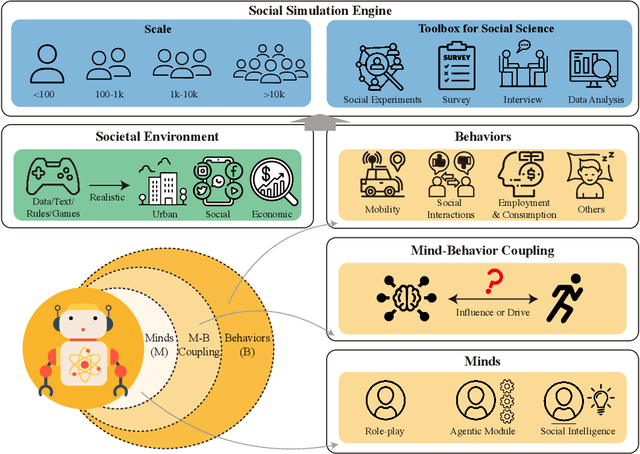
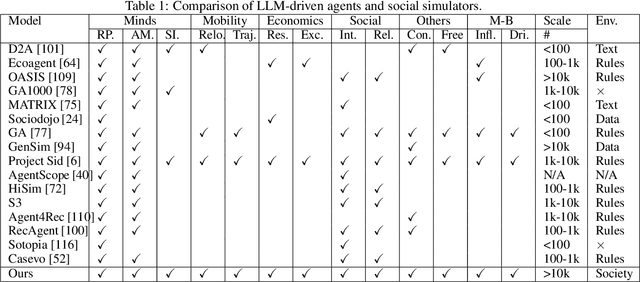
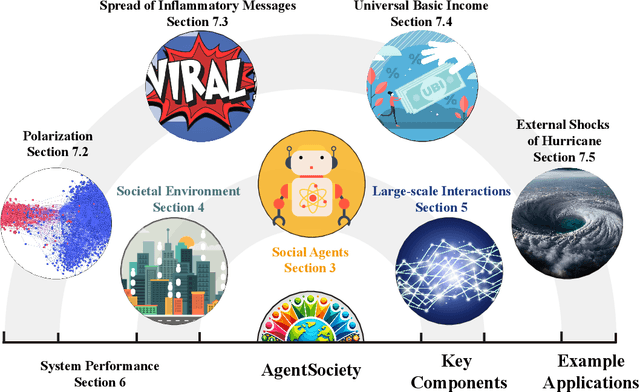

Abstract:Understanding human behavior and society is a central focus in social sciences, with the rise of generative social science marking a significant paradigmatic shift. By leveraging bottom-up simulations, it replaces costly and logistically challenging traditional experiments with scalable, replicable, and systematic computational approaches for studying complex social dynamics. Recent advances in large language models (LLMs) have further transformed this research paradigm, enabling the creation of human-like generative social agents and realistic simulacra of society. In this paper, we propose AgentSociety, a large-scale social simulator that integrates LLM-driven agents, a realistic societal environment, and a powerful large-scale simulation engine. Based on the proposed simulator, we generate social lives for over 10k agents, simulating their 5 million interactions both among agents and between agents and their environment. Furthermore, we explore the potential of AgentSociety as a testbed for computational social experiments, focusing on four key social issues: polarization, the spread of inflammatory messages, the effects of universal basic income policies, and the impact of external shocks such as hurricanes. These four issues serve as valuable cases for assessing AgentSociety's support for typical research methods -- such as surveys, interviews, and interventions -- as well as for investigating the patterns, causes, and underlying mechanisms of social issues. The alignment between AgentSociety's outcomes and real-world experimental results not only demonstrates its ability to capture human behaviors and their underlying mechanisms, but also underscores its potential as an important platform for social scientists and policymakers.
A Survey on Responsible LLMs: Inherent Risk, Malicious Use, and Mitigation Strategy
Jan 16, 2025



Abstract:While large language models (LLMs) present significant potential for supporting numerous real-world applications and delivering positive social impacts, they still face significant challenges in terms of the inherent risk of privacy leakage, hallucinated outputs, and value misalignment, and can be maliciously used for generating toxic content and unethical purposes after been jailbroken. Therefore, in this survey, we present a comprehensive review of recent advancements aimed at mitigating these issues, organized across the four phases of LLM development and usage: data collecting and pre-training, fine-tuning and alignment, prompting and reasoning, and post-processing and auditing. We elaborate on the recent advances for enhancing the performance of LLMs in terms of privacy protection, hallucination reduction, value alignment, toxicity elimination, and jailbreak defenses. In contrast to previous surveys that focus on a single dimension of responsible LLMs, this survey presents a unified framework that encompasses these diverse dimensions, providing a comprehensive view of enhancing LLMs to better serve real-world applications.
Artificial Intelligence for Complex Network: Potential, Methodology and Application
Feb 23, 2024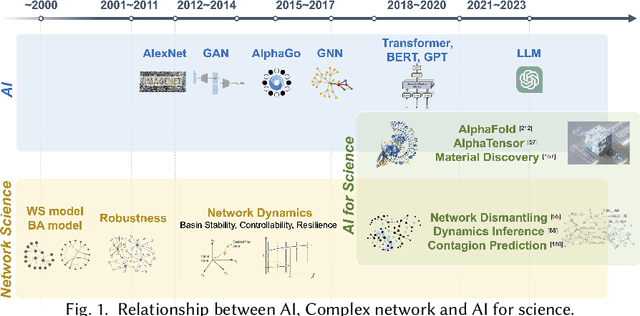
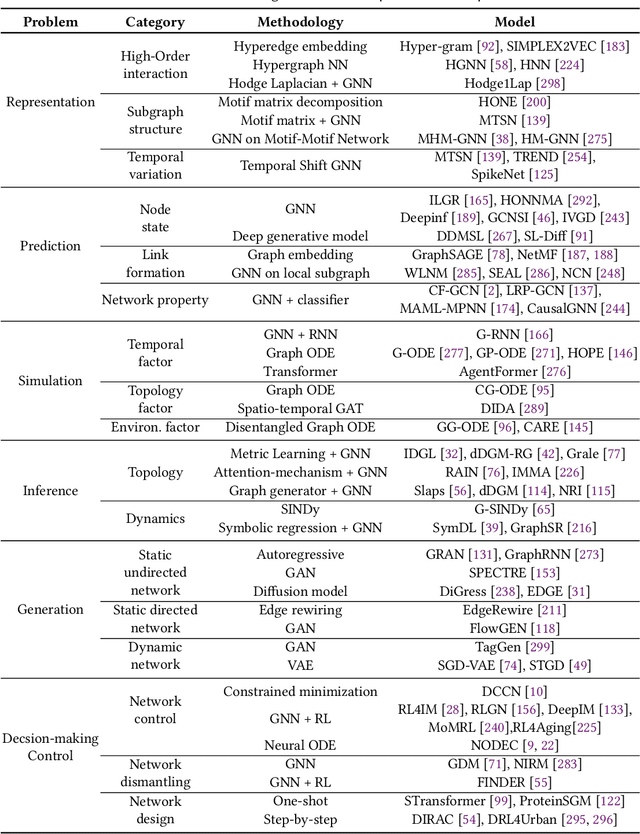
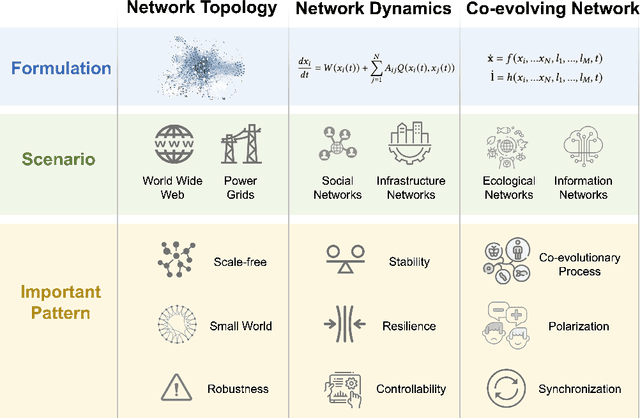
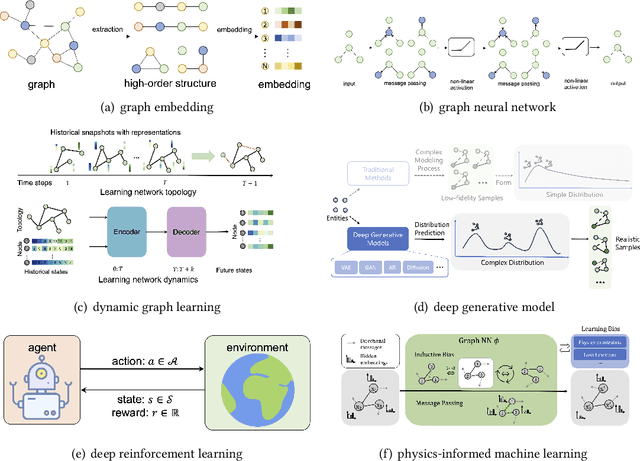
Abstract:Complex networks pervade various real-world systems, from the natural environment to human societies. The essence of these networks is in their ability to transition and evolve from microscopic disorder-where network topology and node dynamics intertwine-to a macroscopic order characterized by certain collective behaviors. Over the past two decades, complex network science has significantly enhanced our understanding of the statistical mechanics, structures, and dynamics underlying real-world networks. Despite these advancements, there remain considerable challenges in exploring more realistic systems and enhancing practical applications. The emergence of artificial intelligence (AI) technologies, coupled with the abundance of diverse real-world network data, has heralded a new era in complex network science research. This survey aims to systematically address the potential advantages of AI in overcoming the lingering challenges of complex network research. It endeavors to summarize the pivotal research problems and provide an exhaustive review of the corresponding methodologies and applications. Through this comprehensive survey-the first of its kind on AI for complex networks-we expect to provide valuable insights that will drive further research and advancement in this interdisciplinary field.
Practitioners Versus Users: A Value-Sensitive Evaluation of Current Industrial Recommender System Design
Aug 08, 2022


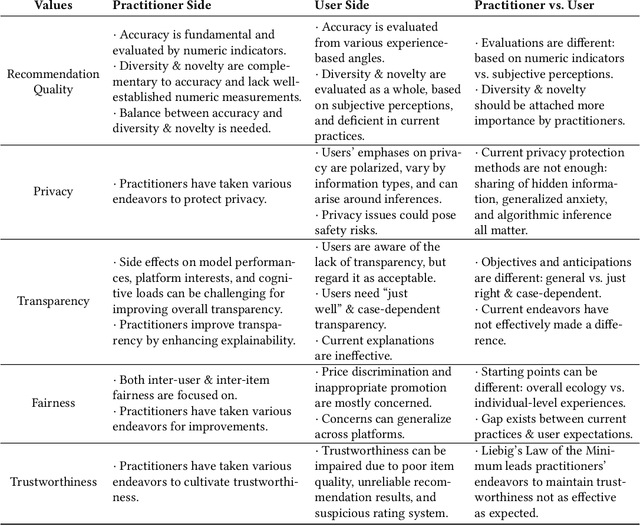
Abstract:Recommender systems are playing an increasingly important role in alleviating information overload and supporting users' various needs, e.g., consumption, socialization, and entertainment. However, limited research focuses on how values should be extensively considered in industrial deployments of recommender systems, the ignorance of which can be problematic. To fill this gap, in this paper, we adopt Value Sensitive Design to comprehensively explore how practitioners and users recognize different values of current industrial recommender systems. Based on conceptual and empirical investigations, we focus on five values: recommendation quality, privacy, transparency, fairness, and trustworthiness. We further conduct in-depth qualitative interviews with 20 users and 10 practitioners to delve into their opinions towards these values. Our results reveal the existence and sources of tensions between practitioners and users in terms of value interpretation, evaluation, and practice, which provide novel implications for designing more human-centric and value-sensitive recommender systems.
Graph Neural Networks for Recommender Systems: Challenges, Methods, and Directions
Sep 27, 2021



Abstract:Recommender system is one of the most important information services on today's Internet. Recently, graph neural networks have become the new state-of-the-art approach of recommender systems. In this survey, we conduct a comprehensive review of the literature in graph neural network-based recommender systems. We first introduce the background and the history of the development of both recommender systems and graph neural networks. For recommender systems, in general, there are four aspects for categorizing existing works: stage, scenario, objective, and application. For graph neural networks, the existing methods consist of two categories, spectral models and spatial ones. We then discuss the motivation of applying graph neural networks into recommender systems, mainly consisting of the high-order connectivity, the structural property of data, and the enhanced supervision signal. We then systematically analyze the challenges in graph construction, embedding propagation/aggregation, model optimization, and computation efficiency. Afterward and primarily, we provide a comprehensive overview of a multitude of existing works of graph neural network-based recommender systems, following the taxonomy above. Finally, we raise discussions on the open problems and promising future directions of this area. We summarize the representative papers along with their codes repositories in https://github.com/tsinghua-fib-lab/GNN-Recommender-Systems.
 Add to Chrome
Add to Chrome Add to Firefox
Add to Firefox Add to Edge
Add to Edge